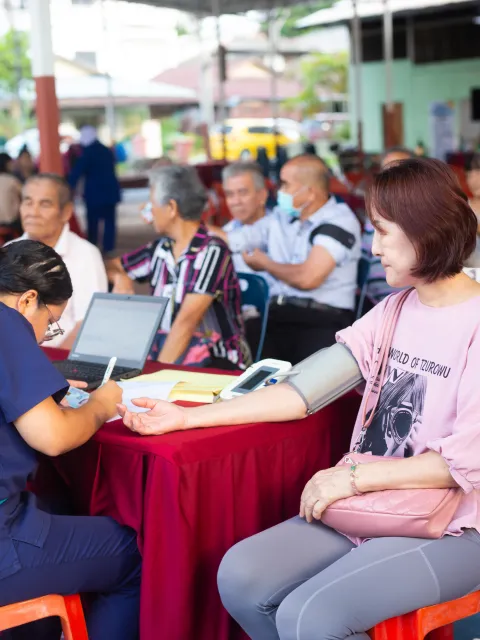Sharing best practices in breast cancer control
UICC’s Project ECHO® for breast cancer control began this week with organisations from 20 LMICs across the world. Their projects cover a range of issues focused on improving breast cancer control and patient outcomes.

UICC received 51 applications from breast cancer-focused organisations interested in participating in the new Project ECHO for Knowledge Summaries for Comprehensive Breast Cancer Control, which is led by UICC, together with the NCI Center for Global Health and the Breast Health Global Initiative.
Following the selection process, some 120 individuals from 25 organisations in 20 low- and middle-income countries (LMICs) were invited to join the 2020-2021 Project ECHO cohort, which will run until May 2021. Applications were assessed against a range of criteria, including quality, relevance with the respect to the Project ECHO curriculum, regional diversity and potential for impact.
Participants met virtually for the first time on the 12th November. They represent a diverse range of organisations, from regional hospitals, patient groups, ministries of health, universities and cancer associations. All work hand-in-hand with other key stakeholders in their countries to address breast cancer and bring concrete solutions to support the breast cancer patients with which they work.
Each organisation is represented on the Project ECHO course by three to four team members responsible for developing and delivering a specific breast cancer-focused project. Working together in teams and learning from like-minded peers, participants will learn how to apply the Knowledge Summaries on Breast Cancer Control to their project and respective settings over a period of six months.
The selected projects for the course cover a range of issues. More than half include a focus on early detection, 25% on improving access to treatment and 15% concentrate on palliative and supportive care. Specific topics include improving patient pathways in Botswana; expanding access to genetic testing in Brazil; improving early detection in Lebanon through workshops on self-examination promoted nationally on TV and radio; and increasing access to medicines in the Philippines. The full list of projects is provided below.
When asked to articulate their expectations of this ECHO course in a orientation call conducted early October, participants expressed their will to “improve the quality of care for breast cancer treatment at a regional level”, to “learn what will make our work more effective”, to “exchange knowledge beyond borders”, and to “learn as much from fellow participants". This matches UICC’s ambitions for the course and for the new cohort of breast cancer professionals.
The Project ECHO on breast cancer control is part of UICC’s Breast Cancer Programme, supported by Pfizer, Daiichi-Sankyo, the NCI Center for Global Health and the Breast Health Global Initiative, and contributes to the goals of the Breast Cancer Initiative 2.5.
List of projects selected to participate in UICC’s Project ECHO on breast cancer control
|
Country |
Organisation |
Title of the project |
|---|---|---|
|
Botswana |
University of Botswana |
Demonstration of a Scalable Breast Health Care Pathway: Experience from Botswana |
|
Brazil |
FEMAMA |
Expanding Access to Genetic and Genomic Tests in Cancer in Brazil |
|
Brazil |
Hospital de Base – FUNFARME |
Implementation of an Institutional Database on Breast Cancer Unit to Support and Guidance of Assistance Planning and Qualification of Health Care |
|
Burkina Faso |
Ligue Burkinabè Contre le Cancer du Sein (LIBUCAS) |
Social Reinsertion of Women who underwent Mastectomy for Breast Cancer |
|
Burundi |
Ministry of Health |
Sensitisation of Political and Administrative Authorities on the Value of Early Breast Cancer Screening |
|
Egypt |
Shefaa Al Orman Oncology Hospital |
Early Detection of Breast Cancer Based on Genetic Screening of Familial Cancers |
|
El Salvador |
Fundación Edificando Vidas, El Salvador |
Strengthening our Services with Early Breast Cancer Diagnosis, and Developing an Impact Campaign for the Defense of Patients |
|
El Salvador |
ASAPRECAN |
Initiative against Breast Cancer in El Salvador |
|
Georgia |
Georgian-Dutch Hospital; Georgian Patients' Union |
Women Programme: Access to Breast Cancer Screening and Patient’s Rehabilitation after Treatment |
|
India |
Homi Bhabha Cancer Hospital & Research Center, Tata Memorial Center |
Building and Implementing Strategies for Comprehensive Breast Cancer Care in East India |
|
India |
Max Superspecialty Hospital Vaishali |
Breast Cancer Awareness & Reducing Delay in Presentation and Diagnosis of Breast Cancer |
|
Indonesia |
The Indonesia Breast Cancer Foundation |
Promoting Self Breast Examination and Clinical Breast Examination in Indonesia |
|
Indonesia |
Rumah Sakit Kanker Dharmais, National Cancer Center |
Patient’s Breast Cancer Management Time |
|
Ivory Coast |
Programme National de Lutte contre le Cancer |
National Strategic Planning against Breast Cancer |
|
Jordan |
King Hussein Cancer Foundation |
Breast Cancer Early Detection project |
|
Kenya |
International Cancer Institute |
Education and Training of Front-line Health Care Providers to improve Early Detection of Breast Cancer |
|
Kuwait |
Fadia Survive & Thrive Cancer Association |
Supporting Critically Ill breast cancer patients with Dedicated Advocacy Campaigns and Training |
|
Lebanon |
The Lebanese Breast Cancer Foundation |
Patient Empowerment Workshop |
|
Malaysia |
MAKNA |
MAKNA Digital Mobile Mammogram Unit |
|
Mexico |
Fundación CIMA |
Educational Model "CIMA" |
|
Myanmar |
Pun Yaung Hnin Si (Pink Rose) Breast Cancer Patients Support Group |
“You Can Breast Health Club”: Empowering Healthy Women of Myanmar to Enhance Breast Cancer Awareness and to Take Action |
|
Namibia |
Cancer Association of Namibia |
Early Detection: Breast Health Awareness and Clinical Breast Examination |
|
Nigeria |
Medicaid Cancer Foundation |
Community Awareness Creation and Training of Healthcare Workers in Kebbi State |
|
Nigeria |
Run For a Cure Africa |
The Pink Ed Project for Early Breast Cancer Detection in Nigeria |
|
Philippines |
Ministry of Health |
Breast Cancer Medicine Access Programme |
Last update
Friday 22 October 2021
